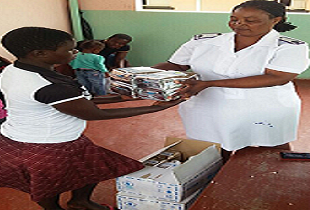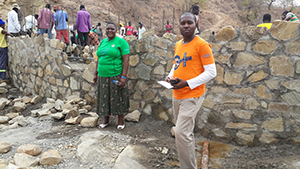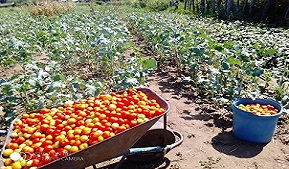
SPOTLIGHT INITIATIVE PROJECT – UNWOMEN 2019 to CURRENT
Lower Guruve Development Association (LGDA) has over the past three years been working in gender transformation as 54% of the Mashonaland Central Province are women. The Organisation raised awareness ... on women and child rights as stipulated in the global, the regional conventions and the Zimbabwean constitution over the years and capacitated the communities on Gender based Violence in Mbire District. The organization has recently implemented a two- year project in partnership with the UNWOMEN with an aim of mobilizing action for the reduction of Violence Against Women and Girls (VAWG). The project entitled ‘Scaling-up Movement Building to End Violence Against Women and Girls in the Mashonaland Central Province was implemented in four districts of Mbire, Rushinga, Guruve and Muzarabani. The project demonstrated the effectiveness of supporting vibrant social movements building inclusiveness, participatory approaches, peer and cohort learning and innovation in curbing Gender Based Violence (GBV), harmful practices (HP) and VAWG. The movement made significant progress in strengthening the capacity, voice amplification and participation of men, women, boys, girls, religious and traditional leaders in initiatives meant to curb GBV, child marriages and harmful practices through innovations such as Innovators Against Gender Based Violence (IAGs), Men-Enough Initiative (male involvement), Catch Them Young initiative, Youth Platforms, and use of opinion leaders. The Project also contributed towards the implementation of actions aimed at eliminating GBV and address strategic and gender sensitive needs and priorities of vulnerable communities.
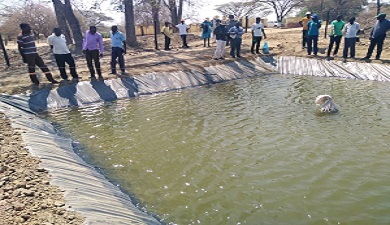
Strengthening Biodiversity and Ecosystems Management and Climate-Smart Landscapes in the Mid to Lower Zambezi Region of Zimbabwe - UNDP
Lower Guruve Development Association also has experience in working in Climate justice with over 10 years of ensuring increased communities’ capacity to manage sustainable ...agro-ecological systems in fragile and drought prone communities. The organization is currently implementing a project funded by the United Nations Development Programme (UNDP) titled Strengthening Biodiversity and Ecosystems Management and Climate-Smart Landscapes in the Mid to Lower Zambezi Region of Zimbabwe (2020-2023). The project’s primary objective is to increase communities’ capacity in Sustainable Forest Management (SFM), Sustainable Land Management (SLM), and Human Wildlife Conflict (HWC) and development of sustainable biodiversity friendly sources of income. The intervention targets rural marginalised communities living close to national parks and or wildlife conservancies.
The intervention outputs and outcomes include:
Promotion of Climate Smart Agriculture – Integrated Small Grains production A total of
250 farmers were trained on climate smart agriculture and received 5kg sorghum, 5kg
groundnuts and 5kg cowpeas seed for planting in Mbire District. Data collected showed
that the programme contributed immensely towards food security amongst most of the
participating households. More than 9% of the participating households harvested
cereal that would last them between 12 to 24 months. Almost 38% harvested cereal that
would last them for 10 to 11 months. About 41% of the households which participated
have cereal lasting between 5 and 9 months.
Promotion of Green Energy – four solar powered water systems were established to
supply water for irrigating gardens which have 32, members, 18 members, 39 members
and 50 members respectively. Solar powered water supply system was established for
three fish farming projects in Mbire District.
Promotion of conservation and reduction of Human Wildlife Conflict – a total of 100
beehives were distributed to communities and act as learning and demonstration sites.
It is interesting that the honey farmers have already started reaping yields by harvesting
honey for sale and household consumption. Fish farming demonstration and learning
centres were also established. It is encouraging that non-participating members are
adopting the idea and developing fish farming projects at their own homesteads. This
reduces, human-wildlife conflict which used to be rampant when people go for unsafe
fishing in the crocodile infested rivers.
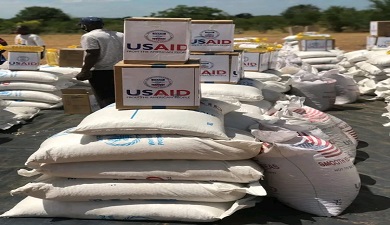
LEAN SEASON ASSISTANCE PROGRAMME
LGDA has, since 2014 been implementing food assistance programmes with support from the World Food Programme. Assistance has been given to vulnerable food insecure households. Assisted households are given nutritious foods which include... cereal, pulses and vegetable oil. Children under five years of age, Pregnant and Lactating Women sometimes also receive Corn Soya Blend for a healthy and active life. Targeted districts include Guruve, Mazowe, Mbire and Sanyati. Need for assistance is evidence based and guided by assessments which are conducted by the Government of Zimbabwe, development partners and the United Nations, mostly through the Zimbabwe Vulnerability Assessment Committee, the Integrated Phase Classification for Food Insecurity and WFP Integrated Context Analysis. Triggers to food insecurity for the past decade include, long dry spells, floods which was away crops, pests and diseases, hyper-inflationary environment, and of late COVID-19 restrictions among other this.
